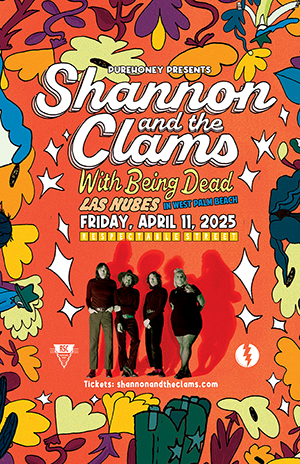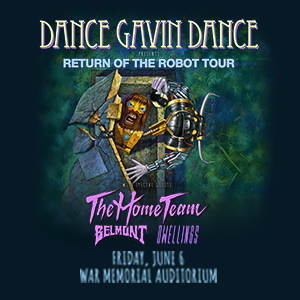Film Review: ‘Jodorowsky’s Dune’ celebrates the creativity necessary to do justice in sci-fi cinema
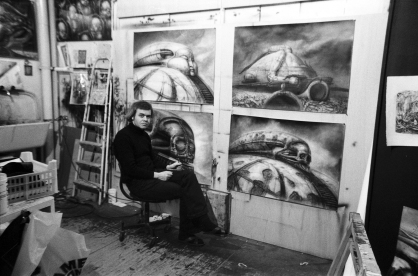 To many, the new documentary Jodorowsky’s Dune will feel like a nice consolation for the fact that cult filmmaker Alejandro Jodorowsky never finished his version of Frank Herbert’s esteemed sci-fi epic. It’s a terrific chronicle of the Chilean director’s ambitious planning to prepare a thorough treatment for his first film proposed to major Hollywood studios. But it is also a celebration of unfettered creativity in all its glorious excess.
To many, the new documentary Jodorowsky’s Dune will feel like a nice consolation for the fact that cult filmmaker Alejandro Jodorowsky never finished his version of Frank Herbert’s esteemed sci-fi epic. It’s a terrific chronicle of the Chilean director’s ambitious planning to prepare a thorough treatment for his first film proposed to major Hollywood studios. But it is also a celebration of unfettered creativity in all its glorious excess.
For Jodorowsky, a film about several worlds fighting for possession of a substance that expands consciousness should be treated literally as a mind-altering experience. When he set out to adapt the beloved book (which he admits he never read) in 1975, he said he wanted to not just make a film but “a prophet.” He wanted to alter viewers’ sense of perception. He says he wanted to create the cinematic sensation of taking LSD.
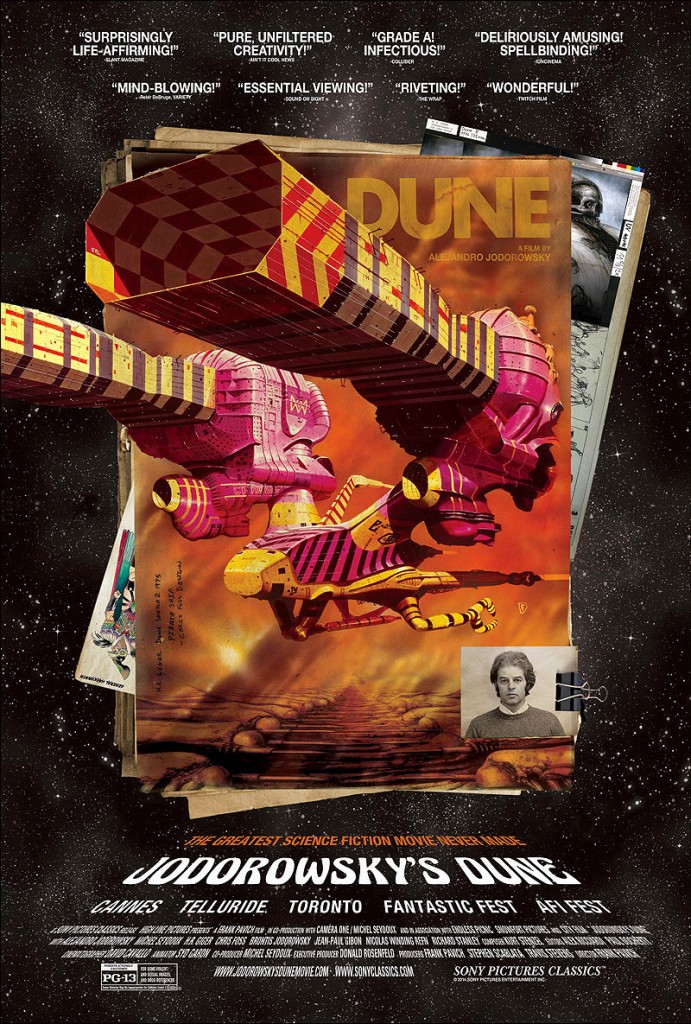 What resulted was several hard-bound books of spaceship designs, character sketches, costumes and storyboards that detailed his vision … but no film. In this documentary, filmmaker Frank Pavich interviews Jodorowsky who waffles between the bright side of bringing a new vision to Hollywood that predated Star Wars and a suppressed rage at the machine that stifled his vision.Pavich also brings to life the images of the book by editing together the story boards and animating some of the many detailed concept designs of the spaceships by rendering them digitally. The camera pans and scales over the static images from the book. There are sound effects and an eerie, Moog-drenched score by Kurt Stenzel that could have been the score to Jodorowky’s Dune. It’s as close to the would-be movie as we get.
What resulted was several hard-bound books of spaceship designs, character sketches, costumes and storyboards that detailed his vision … but no film. In this documentary, filmmaker Frank Pavich interviews Jodorowsky who waffles between the bright side of bringing a new vision to Hollywood that predated Star Wars and a suppressed rage at the machine that stifled his vision.Pavich also brings to life the images of the book by editing together the story boards and animating some of the many detailed concept designs of the spaceships by rendering them digitally. The camera pans and scales over the static images from the book. There are sound effects and an eerie, Moog-drenched score by Kurt Stenzel that could have been the score to Jodorowky’s Dune. It’s as close to the would-be movie as we get.
But that’s not the point of this documentary.
Jodorowsky’s Dune is really about the vision of the cult director that ultimately expands the consciousness of Hollywood for the daring vision needed to pull off science fiction with respect to considering possibilities that go beyond earthbound thinking. Directors like George Lucas, Ridley Scott and James Cameron are indeed indebted to Jodorowsky for planting the seed of possibility for latter-day sci-fi work such as their’s.

Jodorowsky gathered a true dream team of collaborators, or, as he calls them, warriors, to make his film. He hired people like H.R. Giger, who would later design the title monster of the Alien movies, to design the world of the evil Harkonnen. The dark prog rock band Magma was to compose all the music associated with it. Meanwhile, Pink Floyd agreed to also provide original music and Chris Foss andJean “Moebius” Giraud were brought in for design and artwork. Dan O’Bannon who would go on to write the screenplay for Alien was hired as a screenwriter based on what Jodorowsky saw in Dark Star. Clearly inspired about by Kurick’s 2001: A Space Odyssey, Jodorowsky also pursued that film’s Oscar-winning effects man Douglas Trumbull. However, Jodorowsky was turned off by his underwhelming, practical bottom-line attitude. He was no spiritual warrior for Dune.
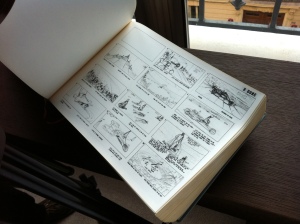
The beauty of this documentary comes from its ability to channel Jodorowsky’s lively attitude for art as enlightenment and spiritual home. When he says he does not want to compromise to the studios even if it means the demise of his project, it becomes the right thing. It’s as if Jodorowsky’s Dune fell apart as a martyr so it might inspire films like Star Wars and Alien.
As ever with Jodorowsky, there’s humor in his wisdom. When Star Wars fans bemoaned George Lucas’ revisinghis films with digital effects in the 1990s the mantra became “George Lucas raped my childhood.” Jodorowsky, however, proudly declares, “I raped Frank Herbert,” as he thrusts his hips back and forth holding an imaginary book doggy style in front of him. In that charming Jodorowsky way of his, he is not belittling the source material. Instead, he compares it to the consummation of marriage, taking a virginal bride dressed in white to the bedroom, tearing away her dress and fucking her. “I raped him with love,” he adds.
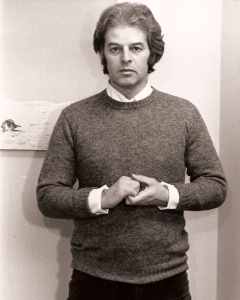
It doesn’t matter that Jodorowsky never read the book. What matters is that he created his own work, something that has only gained more value over time. The legend grows as with its mystical possibilities, hence the notion that this may indeed be one of the greatest films never made. Director Nicolas Winding Refn appears early in the documentary to boast that he’s the only one who has seen Jodorowsky’s version of Dune because the director himself sat with him and paged through the book and shared his vision. As we can expect with Refn, it’s a rather juvenile and insulting comment to this idea of possibilities of what the essence of this film did for science fiction cinema. It lowers the film to a materialistic level that defies Jodorowsky’s vision, which belongs to the imagination, and that’s why Jodorowsky’s Dune stands as the greatest sci-fi movie never made.
~Hans Morgenstern, Independent Ethos
Hans Morgenstern is a Miami freelance writer and film critic. He is a member of the Florida Film Critics Circle for his work on indieethos.wordpress.com
Jodorowsky’s Dune runs 90 minutes and is rated PG-13 (for fantastical violent and sexual images and drug references). It opens in South Florida on Apr. 25 in Miami Beach at the Regal South Beach and in Boca Raton at Living Room Theaters and Regal Shadowood. The following week, it opens in Miami at O Cinema Wynwood. It will appear at the Miami Beach Cinematheque on June 7 with other Jodorowsky surprises to be announced. Sony Pictures Classics invited me to a preview screening for the purpose of this review.

